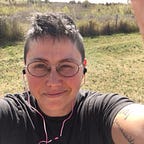with risk to inhabit that whole:* a poem on the legacy of grief
with risk to inhabit that whole*
when asked to bring
my ancestors into the room
alongside those they would
want to harm the answer
is surely no. and i must.
over the years my attempts to bring
an orb of collectivity glowing into the rubble
or a lantern to the wounded cave
has been met with dank pessimism.
turning “i will give up no one” into
i will not give up myself
is a slippery kind of magic
that lends itself to selfishness
and also to liberation.
the collective accounting of rape
has risen through inferno this week.
we each pitch in a stick, a log to the pile.
our molten bodies are turned
to each other now
versed in cautious solidarity.
last night the back of my body
grew dragon wings that were made
from the fire of ancestors screaming
from beyond and within two thousand years
of coercive christianity. of bodies picked apart.
the women of my people are terrified. the women
of my people scream through me and I am the
most recent one to catch fire.
at first afraid, i gathered Leslie Feinberg’s shadow into me.
a butch working with the goddess
asked me to step back into the unknown.
dry heaving next to a toilet in manhattan. a profoundly
stone. butch. blues.
what is it
about grief that makes us brave Leslie?
the risk of accounting for ancestral harm.
ancestral trauma. ancestral ambivalence.
a full body incineration. a legacy
to inhabit that whole.
*this title (and poem) is derived from words within a passage of writing by Dorothy Allison “I am certain that none of us wants to live with the fear, the sense of loss, betrayal, and risk that I worry at all the time. I know that many of us want what Barbara Smith described in her short story- the ability to love without fear of betrayal, the confidence that we can expose our most hidden selves and not have the women we love literally disappear from our lives. I know, too, that we cannot inhabit that safe ground easily. If we are not to sacrifice some part of ourselves or our community, we will have to go throughthat grief, the fear of exposure, and struggle, with only a thin layer of trust that we will emerge whole and unbroken. I know of no other way to do this than to start by saying, I will give up nothing. I will give up no one.” “Public Silence, Private Terror.” Skin: Talking about Sex, Class & Literature. Firebrand, Ithica. p. 119
